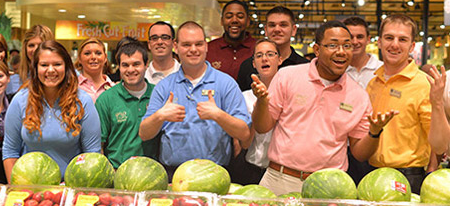With Contributions from General Manager Emile Amarotico & Store Manager Barry Haynes
Interview conducted by Melissa L. Michaels, Capiche Contributor/Strategic Partner, Michaels & Michaels Creative, LLC
Ask any local what the heartbeat of Ashland is, and they’ll probably say the Ashland Food Co-op. It’s not only a place to find healthy, sustainably sourced groceries, but it’s also a social hub where you can meet with friends and colleagues while enjoying selections from the Co-op Kitchen’s 200+ menu options. The Co-op team truly puts “people, the planet, and principles before profit.”
The vibrant, joyful culture visible in the Co-op workplace reflects the fruit of labors undertaken by Capiche in collaboration with the Co-op’s leadership and staff as part of a Happiness@Work project in 2013 and 2015. General Manager Emile Amarotico and the board members fully embraced the process and eagerly sought to implement recommendations gathered from employees through Capiche’s appreciative inquiry process. Nearly a decade later, the investment is still paying dividends in both employee satisfaction and the bottom line.
Following is an interview with the Co-op’s new marketing and education manager, Tracy Kaiser, along with GM Emile and Store Manager Barry Haynes.

Q: Tracy, you’ve been in the Rogue Valley since 1998—one year before I arrived, incidentally. Where did you move from, and what did you think of Southern Oregon by comparison?
Tracy: I moved from Stevens Point, Wisconsin, my college town. I was raised in Wisconsin and was the bakery buyer for a mail-order company when I was recruited by Harry & David in 1998.
My father was an outdoor nut, and I was raised with a deep love for nature and wildlife. My dad always wanted to live in the mountains, and he spoke of their beauty and strength often. I can remember flying in for my interview with Harry & David. My flight arrived after dark. I was staying at the Morical House, an Ashland B&B, and I drove directly there to rest for the evening. The next morning, I pulled back the drapes and had this warm feeling that I was home. Since that moment, I cannot imagine living anywhere else but the Pacific Northwest.
Q: Prior to becoming marketing and education manager at the Ashland Food Co-op, you were senior director of product development and innovative merchandising at Harry & David. How did this prepare you to excel in your role at the Co-op?
Tracy: Harry & David is a full circle business model. We had to excel at process procedure, product development, creativity, finances, and tight timelines as well as having or learning a deep understanding for operations and orchard management. My senior VP was my mentor for several years, and I often recall the management practices she instilled within me.
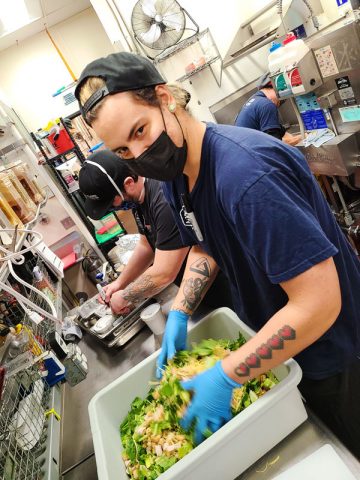
Q: As a newcomer to the Ashland Food Co-op team, what was your initial impression of the workplace culture, and do you feel the Co-op’s mission is aligned with its brand?
Tracy: Before I started my career at AFC, I felt deeply connected with the team because I shopped there almost daily. The Co-op was my social hub! After I was hired for my position, I felt the connection deepen even more within the team. Do I feel the Co-op’s mission is aligned with our brand? Oh, yes! Spend five minutes with Lynn Scionti, one of our product managers who has been with the Co-op for 40 years! She is the embodiment of Co-op values and strives to bring our community the best products at the best price. Lynne truly inspires me on many levels, including the fact she stocks shelves like she is 25.
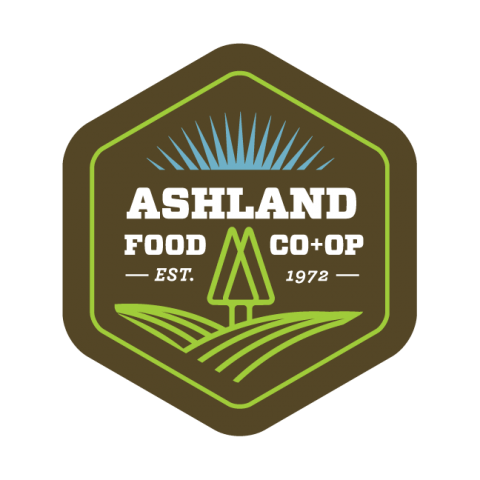
Q: You are actually witnessing the long-term impact of the Happiness@Work project conducted in 2013 and 2015 in collaboration with Capiche. Chris Cook wrote an article about this innovative work for Cooperative Grocer magazine in which she details the approach taken. This involved conducting a Happiness Works organizational assessment followed by an appreciative inquiry process. Three volunteer teams were formed to implement solutions based on the data collected: Communication & Cooperation, Renewal & Stress Management, and Learning & Development. Is this work still paying dividends today, both in terms of employee satisfaction and Co-op profits?
Emile: The Happiness@Work initiative inspired a number of communication enhancements that continue today. Until COVID precluded group get-togethers, we have produced twice yearly All Store Assemblies chock-full of updates and trainings. We routinely conduct Team Huddles to keep members informed and provide space for dialogue. A weekly Huddle News email provides storewide messaging to team leaders and desk workers. We have just launched BeeKeeper, a mobile communication platform accessible to frontline employees via mobile device as well as desktop. In time, this may replace decades-old all store and department paper logbooks. It will integrate a number of other Happiness@Work-inspired programs, including our weekly employee surveys and our shoutout board used to recognize peer successes and gratitude.
The most tangible enhancements to renewal and stress management are the outdoor break area, which has literally blossomed, and a complete renovation of the indoor break/food prep area, including new fixtures, counters, seating, and computer “non”-workstations!
We have integrated volumes of training for all employees as well as curriculums relevant to specific workers. Examples include implicit bias and cultural agility awareness, harassment, and active shooter training.

Q: What was it like working with Chris?
Emile: The twinkle in Chris’s eye belies keen insights into what makes people tick, be it in the workplace or the marketplace. Perhaps it’s a twinkle of magic!
The Happiness@Work project was born out of tension created around whether or not to unionize. As the issue was resolved and the employees created their own union, the Co-op’s leadership felt it was time to realign with the Co-op’s mission and vision: “joyfully working together, providing a workplace that fosters opportunities for participation, empowerment and growth in an environment of mutual respect and cooperation.”
The Ashland Food Co-op created a Happiness@Work Team comprising board members, the general manager, and representatives from the newly formed employee alliance. After reviewing several proposals from consultants, the Co-op selected Capiche for the project.…
General Manager Amarotico says, “This work has had a positive impact on employee engagement. By implementing solutions they’ve designed, employees enliven the entire organization. It’s great that we’re making strides toward a happy workplace and have solutions being designed and implemented. The key take-away is that the results will include more productivity, happier customers, and an atmosphere with a vibe that more people want to participate in.”
Amarotico adds, “I would recommend Capiche to any organization that is truly committed to engaging with the nerve system of their organization with the intention of creating positive change.”
—What Would Increased Happiness Do for Your Business? Ashland Food Co-op Aligns Mission with Culture, Boosts Financial Success, by Chris Cook for Cooperative Grocer magazine
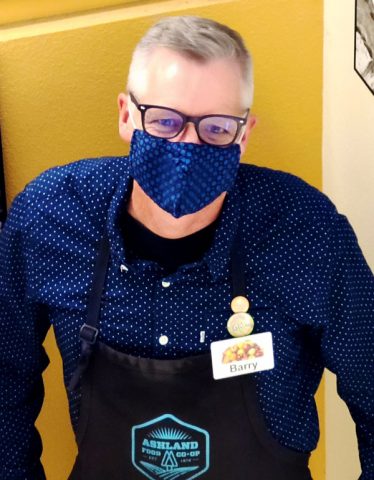
Q: Recently, Barry Haynes was promoted from produce manager to store manager. He was part of this exploratory process and is a real-life example of Happiness@Work in action. What sets the experience of a Co-op employee apart from a typical job?
Barry: Working at the Co-op provides the opportunity to be a part of a community and family that is not usually found in the typical work environment. Management believes in Servant Leadership and approaches every day with the intent of making everyone’s workday experience a positive one.
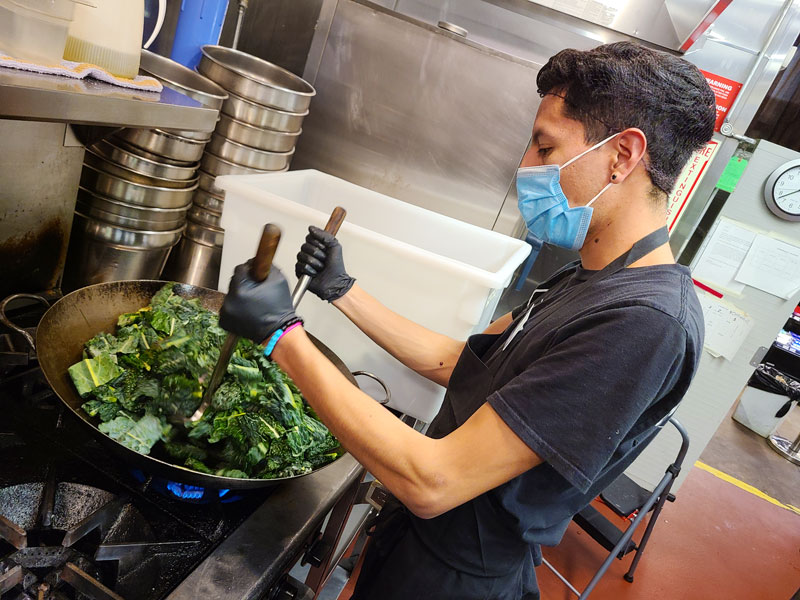
Q: How has your team pulled together in the face of COVID challenges? What measures has the Co-op taken to help keep the staff and community safe, and how has the shopping experience changed as a result—including the addition of curbside pickup and an online store?
Barry: The challenges of the pandemic have taken a toll on essential workers everywhere. All employees have been receiving a Hero Pay differential since the early stages of the pandemic. Additionally, we have been providing a meal to employees for every shift worked as well as numerous gift certificates and other benefits intended to maintain positive morale.
We have implemented numerous protocols and protective measures ahead of and beyond state requirements. Shopping patterns have drastically changed. Average basket size has increased, and customers are visiting us less frequently to limit their exposure.
The creation of online shopping with curbside pickup was a priority, and the team moved quickly to successfully execute this project.

Q: How did the Co-op respond in the aftermath of the Almeda Fire as community members found themselves in dire need of resources?
Tracy: From day one of the Almeda Fires, the Co-op team wanted to help the community. They reached out to vendors across the region and country to ask for their help with products, supplies, and food to get to the fire victims.
And that help came through in big ways, getting nutritious food to displaced families, home supplies in high demand, and wellness and food for first responders and firefighters. These donations and distributions wouldn’t be possible without our dedicated and well-connected Co-op team.
 The other way we were able to help get resources back to the fire victims was through our new Round Up Program called Change for Good. We quickly communicated to our community about the need to support displaced families and how they could easily help the community by rounding up their change when they were at the cash register checking out. In very little time, we had over $75,000 donated from our community, and the donations were distributed throughout local organizations supporting our displaced community members.
The other way we were able to help get resources back to the fire victims was through our new Round Up Program called Change for Good. We quickly communicated to our community about the need to support displaced families and how they could easily help the community by rounding up their change when they were at the cash register checking out. In very little time, we had over $75,000 donated from our community, and the donations were distributed throughout local organizations supporting our displaced community members.
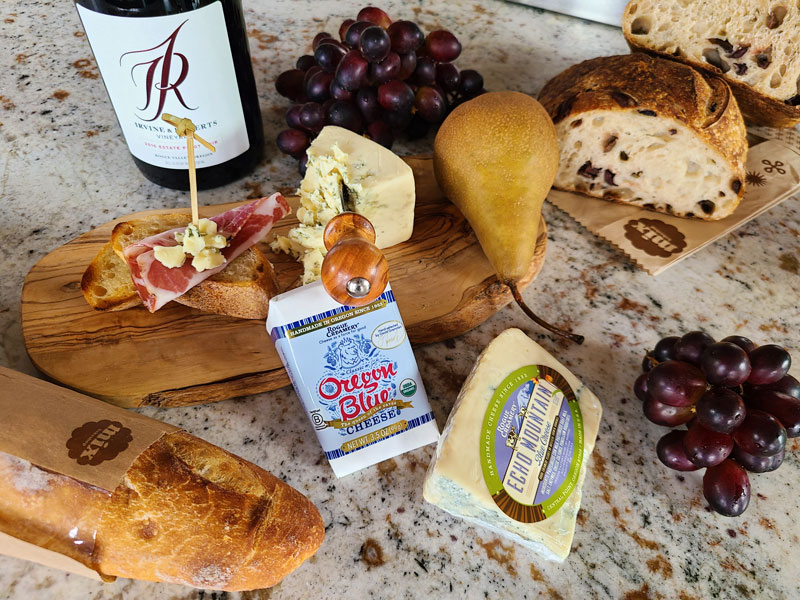
Q: A lot of people are surprised to learn the Co-op Kitchen is the largest restaurant in the City of Ashland—a town acclaimed for its plethora of restaurants. The Co-op Kitchen employs 45 to 50 people and pays more restaurant taxes than any other business in the city. It offers 200+ products and a highly customizable menu suitable for any diet—from vegan to Paleo to keto. What makes the Co-op Kitchen such an attractive option for those seeking dining options in Ashland?
Tracy: As you stated, we offer a robust assortment of products that support a broad range of dietary needs. We take great pride in the quality of our ingredients. Not only are our meal offerings nutritious, they are incredibly delicious! I often express to community members that since I started working for the Co-op, I feel so much healthier, especially when I make an effort to eat at the Hot Bar. We have stepped up our culinary and production game over the last year, and even with all of the shifts in our business practices during COVID, our Prepared Foods Team and executive chef were still able to curate new products for our community.
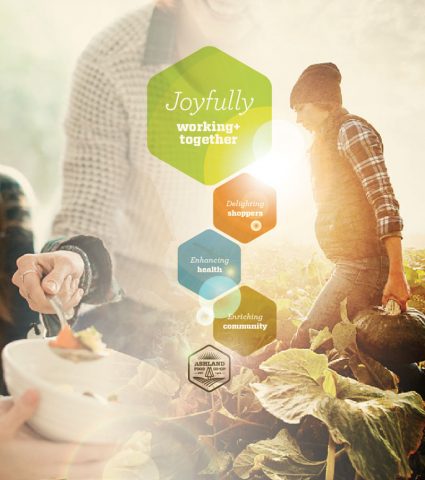
Q: I love the Co-op’s Vision: “Joyfully working together … Delighting shoppers … Enhancing health … Enriching community.” Often, a vision is aspirational, but the Co-op seems to be living this already. What do you envision for the future of the Ashland Food Co-op?
Tracy: Finding new ways to reach more community members with nutrient-rich food and making it approachable to all, even if you are food-insecure. We have a lot of amazing managers and board members who are visionaries and strategic thinkers, and we look forward to potential opportunities to grow our current store footprint or find other locations in Southern Oregon that support our drive to bring nutritious food to all who live in our region.
- Happiness@Work Project
- Organizational Development
- Surveys
- Organizational Assessment
- Research
- Meeting Facilitation

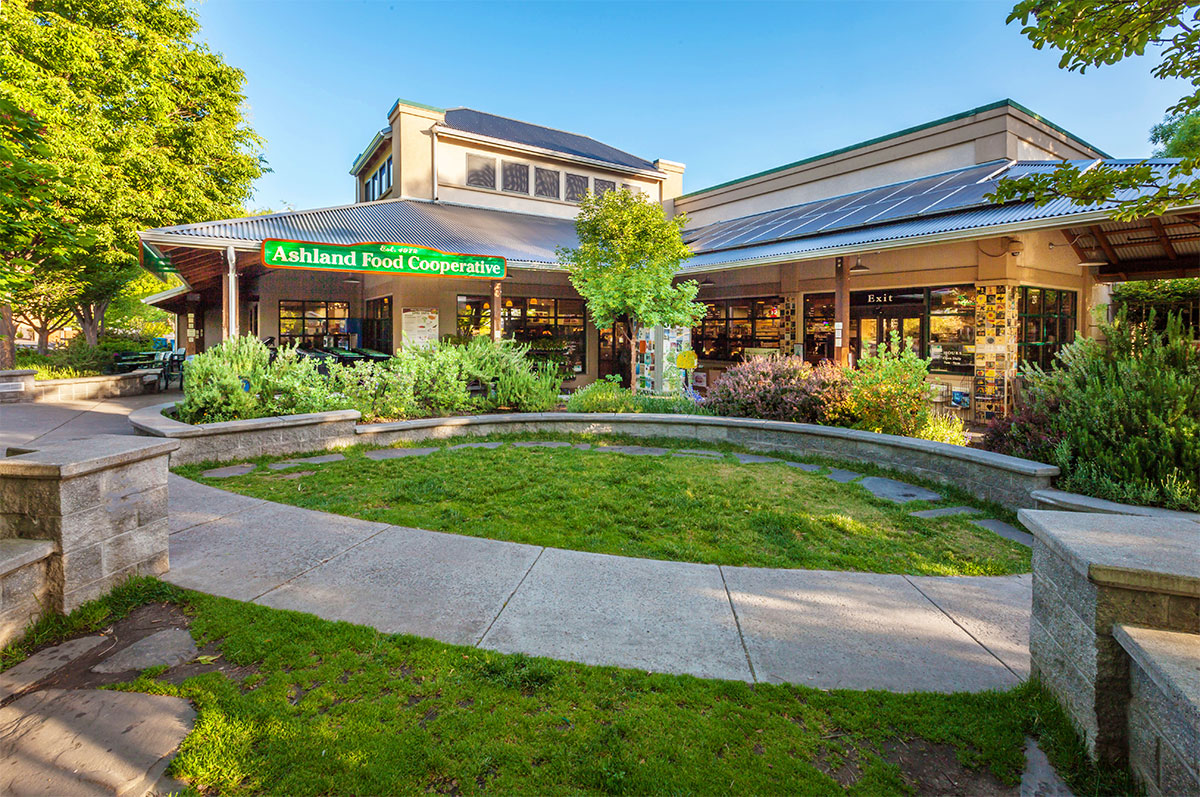

 Along with trusted colleague John Bowling of
Along with trusted colleague John Bowling of  With support from the Board of Directors and management team, these solutions are in the process of being implemented. This process is fully aligned with the Co-op’s mission and vision, which includes “joyfully working together, providing a workplace that fosters opportunities for participation, empowerment and growth in an environment of mutual respect and cooperation.”
With support from the Board of Directors and management team, these solutions are in the process of being implemented. This process is fully aligned with the Co-op’s mission and vision, which includes “joyfully working together, providing a workplace that fosters opportunities for participation, empowerment and growth in an environment of mutual respect and cooperation.”